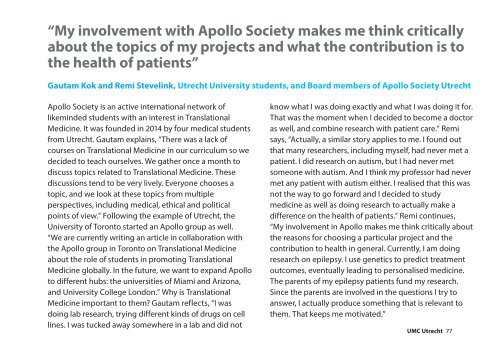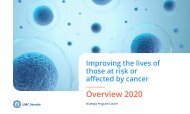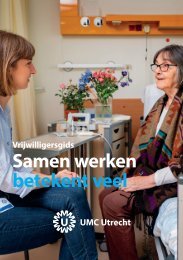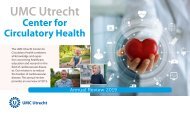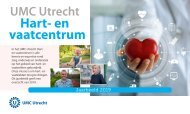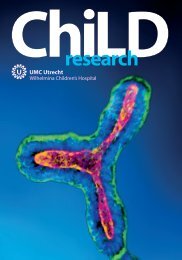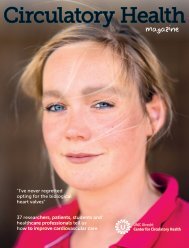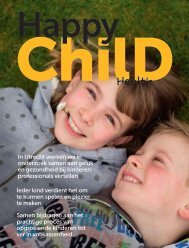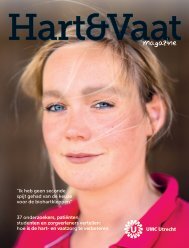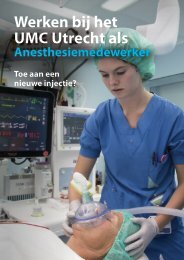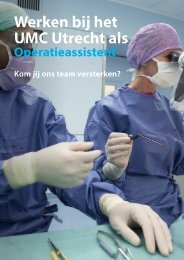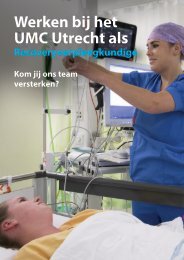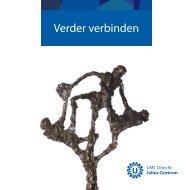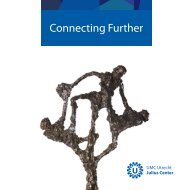RVB Translational Medicine Book
You also want an ePaper? Increase the reach of your titles
YUMPU automatically turns print PDFs into web optimized ePapers that Google loves.
“My involvement with Apollo Society makes me think critically<br />
about the topics of my projects and what the contribution is to<br />
the health of patients”<br />
Gautam Kok and Remi Stevelink, Utrecht University students, and Board members of Apollo Society Utrecht<br />
Apollo Society is an active international network of<br />
likeminded students with an interest in <strong>Translational</strong><br />
<strong>Medicine</strong>. It was founded in 2014 by four medical students<br />
from Utrecht. Gautam explains, “There was a lack of<br />
courses on <strong>Translational</strong> <strong>Medicine</strong> in our curriculum so we<br />
decided to teach ourselves. We gather once a month to<br />
discuss topics related to <strong>Translational</strong> <strong>Medicine</strong>. These<br />
discussions tend to be very lively. Everyone chooses a<br />
topic, and we look at these topics from multiple<br />
perspectives, including medical, ethical and political<br />
points of view.” Following the example of Utrecht, the<br />
University of Toronto started an Apollo group as well.<br />
“We are currently writing an article in collaboration with<br />
the Apollo group in Toronto on <strong>Translational</strong> <strong>Medicine</strong><br />
about the role of students in promoting <strong>Translational</strong><br />
<strong>Medicine</strong> globally. In the future, we want to expand Apollo<br />
to different hubs: the universities of Miami and Arizona,<br />
and University College London.” Why is <strong>Translational</strong><br />
<strong>Medicine</strong> important to them? Gautam reflects, “I was<br />
doing lab research, trying different kinds of drugs on cell<br />
lines. I was tucked away somewhere in a lab and did not<br />
know what I was doing exactly and what I was doing it for.<br />
That was the moment when I decided to become a doctor<br />
as well, and combine research with patient care.” Remi<br />
says, “Actually, a similar story applies to me. I found out<br />
that many researchers, including myself, had never met a<br />
patient. I did research on autism, but I had never met<br />
someone with autism. And I think my professor had never<br />
met any patient with autism either. I realised that this was<br />
not the way to go forward and I decided to study<br />
medicine as well as doing research to actually make a<br />
difference on the health of patients.” Remi continues,<br />
“My involvement in Apollo makes me think critically about<br />
the reasons for choosing a particular project and the<br />
contribution to health in general. Currently, I am doing<br />
research on epilepsy. I use genetics to predict treatment<br />
outcomes, eventually leading to personalised medicine.<br />
The parents of my epilepsy patients fund my research.<br />
Since the parents are involved in the questions I try to<br />
answer, I actually produce something that is relevant to<br />
them. That keeps me motivated.”<br />
UMC Utrecht 77


